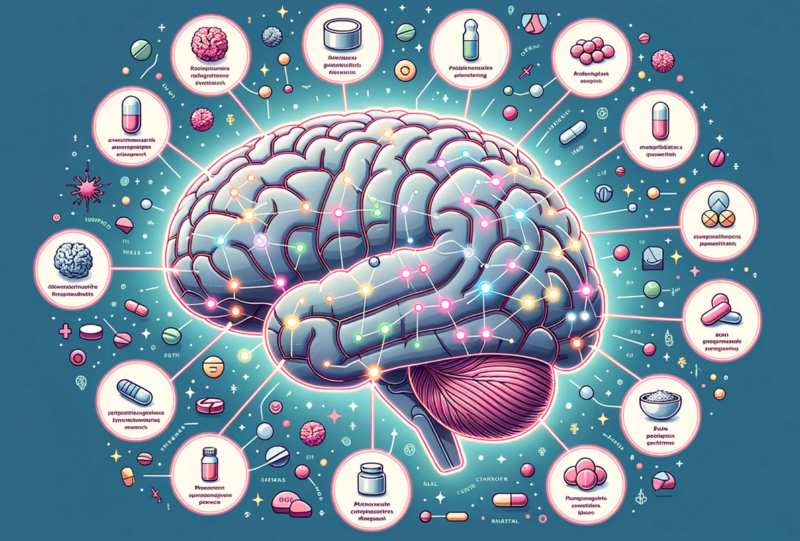Nootropics and Brain Health: Analyzing Cognitive Enhancers

The History of Nootropics: A Cerebral Expedition
In ancient times, the most distinguished philosophers of antiquity would gather in sanctums, donning togas and discussing the mysteries of the universe - and the best ways to enhance their cognitive prowess. During these gatherings, luminaries such as Plato and Aristotle would debate whether the intake of hemlock constituted a nootropic or merely a shortcut to the Elysian Fields.Fast forward a few thousand years, and the quest for cognitive enhancers, or nootropics, has only grown in complexity and enthusiasm. Today, we are inundated with a deluge of information (and misinformation) about these supposed brain boosters. But fear not, for I shall traverse the tumultuous terrain of neural nourishment to dismantle the myths and reveal the truth about nootropics.
Brain Gains: What Are Nootropics?
Nootropics, a term coined by Romanian psychologist Corneliu Giurgea, refer to substances that enhance or protect cognitive function. These compounds work their magic in various ways, from increasing blood flow to the brain to stimulating the production of neurotransmitters. The pantheon of nootropics includes natural and synthetic compounds, as well as prescription medications and off-label uses of other substances.Some popular nootropics include:
- Caffeine: a stalwart in the cognitive-enhancement arsenal, found in your daily cup of productivity juice (also known as coffee).
- Racetams: a group of synthetic compounds that, much like the artist formerly known as Prince, have a penchant for funk and improving memory.
- L-theanine: found in tea leaves, this amino acid is like the ying to caffeine's yang, providing clarity and focus sans the jitters.
- Bacopa monnieri: an herb used in traditional Ayurvedic medicine, Bacopa takes its sweet time to improve memory - but when it does, it's like a gentle caress to your hippocampus.
Understanding the Benefits: Nootropic Novelties or Neural Necessities?
As with most things in life, the efficacy of nootropics is not a one-size-fits-all affair. Some individuals may find certain substances to be potent cognitive enhancers, while others may experience no discernible difference - or worse, a decline in cognitive function (I'm looking at you, hemlock).However, some benefits commonly associated with nootropics include:
- Increased focus and concentration
- Improved memory and learning ability
- Enhanced mood and reduced stress and anxiety
- Protection against age-related cognitive decline
Side Effects and Safety: A Cautionary Tale
As with any substance, nootropics come with potential side effects. The severity and frequency of these side effects vary depending on the substance, dosage, and individual involved. Some common side effects include:- Headaches
- Insomnia
- Digestive issues
- Increased blood pressure
It's also essential to consider the potential interactions between nootropics and any medications you may be taking. Consulting a healthcare professional before experimenting with cognitive enhancers can help ensure that you're not accidentally creating a nootropic cocktail that would make even the most audacious mixologist balk.
Smart Drugs: A Brave New World
As we embark on this cognitive odyssey, it's important to remember that the nootropic landscape is ever-evolving. New compounds are continually being developed, and our understanding of how these substances interact with our brains is advancing at a breakneck pace. As such, it's crucial to remain skeptical, open-minded, and informed.The quest for cognitive enhancement is an exciting and deeply human endeavor. Since the dawn of time, we have sought ways to expand our mental horizons and ascend to new intellectual heights. Nootropics offer us a glimpse into the potential that lies within our craniums, inviting us to redefine the limits of our mental capacity.
So, intrepid explorer of the mind, I urge you to venture forth with curiosity and caution. Take heed of the lessons imparted herein, and may your neural gallivanting be fruitful, enlightening, and - above all else - safe. Happy cognitive adventuring!
Article kindly provided by healthyvoices.net
Latest Articles
- How Oral Health Quietly Influences Energy Sleep and Long Term Well Being
- How Emotions Affect Your Skin
- Everyday Walks as Brain Games for Your Dog
- How Light Weights Can Build Serious Strength
- Missing Dental Supplies and What They're Really Telling You
- Rethinking Early Intervention Strategies for Childhood Behavior Support
- Keep Going: The Brain Science of Turning Setbacks Into Momentum
- Designing Movement Routines That Don't Feel Like Exercise
- Chair Yoga Works Wonders For Bodies Of All Ages
- Eyebrows Through the Ages and What They Reveal About Our Faces
- Feeding Plans That Keep Every Pet in Balance
- Hidden Immune Boost Hiding in Plain Sight for Corporate Travellers
- Evening Quiet Isn't Automatic and That's Perfectly Normal
- Quiet Power Makes a Salon Feel Like a VIP Retreat
- Chewing as Meditation and Everyday Calm
- Sleep Deprivation as a Social Problem, Not a Personal Failure
- Why Recovery Rituals Outlast Resolutions and Keep Us Moving Forward
- Desk Job Survival with a Side of Shoulder Rolls
- Why Your Living Room Layout Might Be Causing Your Back Pain
- Why Your Teeth Love Dental Hygienists
- Nutrition and Dietetics
- Exercise and Fitness
- Meditation and Yoga
- Mental Health
- Women's Health
- Men's Health
- Children's Health
- Senior Health
- Heart Health
- Sleep Health
- Skin Health
- Eye Health
- Dental Health
- Pain Management
- Addiction and Recovery
- Sexual and Reproductive Health
- Alternative Medicine
- Chronic Conditions
- Weight Management
- Occupational Health and Safety
- Public Health
- General Health Tips
- Beauty

